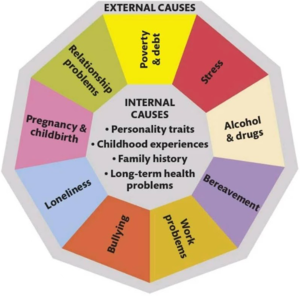Depression
Depression is a form of mental illness which is characterised by persistently depressed mood, loss of interest in activities, or cognitive impairment[1] that causes significant impairment in daily life. The causative factor(s) of the disease may be external (exogenous) or internal (endogenous) in nature (see Figure 1).
Treatment
Depression may be a natural reaction to the environment. To treat the disease, external factors should be eliminated first, then endogenous issues should be explored. The main points to initially address are:
- Healthy diet - supplementation of Vitamin D3 and Omega 3, ↓ alcohol consumption.
- Sunlight - running outside as below can bolster Vitamin D3 as above.
- Exercise - 3+ times a week get heart rate above resting and maintain, walk in nature[2].
- Sleeping well - by exposing yourself to sunlight you can reset your Circadian Rhythm whilst exercise will help you sleep.
- Reducing overstimulation - anti rumination, reduce caffeine intake do more mindfulness and meditation.
- Talking - self therapy, counselling, increase social contact.
Relapse
People who have recovered from an episode of depression (whether spontaneously or following the provision of treatment) are at an increased risk of becoming depressed again in the future. This risk can be as high as 60% for people who have experienced one episode, 70% in those who have had two episodes, and 90% in those who have had three previous episodes (American Psychiatric Association, 2000). Psychological therapies delivered following recovery from depression, including CBT, MBCT, and IPT, may reduce risk of relapse after one year by 22%[3].
References
- ↑ The association between overweight/obesity and poor cognitive function is mediated by inflammation in patients with major depressive disorder. Xiaofeng Lan, Chengyu Wang, Weicheng Li, Ziyuan Chao, Guohui Lao, Kai Wu, Guixiang Li, Yuping Ning, Yanling Zhou, Journal of Affective Disorders, Volume 313, 2022, Pages 118-125,https://doi.org/10.1016/j.jad.2022.06.073.
- ↑ The effects of walking in nature on negative and positive affect in adult psychiatric outpatients with major depressive disorder: Kia Watkins-Martin, Despina Bolanis, Stéphane Richard-Devantoy, Marie-Hélène Pennestri, Catherine Malboeuf-Hurtubise, Frederick Philippe, Julie Guindon, Jean-Philippe Gouin, Isabelle Ouellet-Morin, Marie-Claude Geoffroy, A randomized-controlled study, Journal of Affective Disorders, Volume 318, 2022,Pages 291-298, ISSN 0165-0327, https://doi.org/10.1016/j.jad.2022.08.121.
- ↑ Can non-pharmacological interventions prevent relapse in adults who have recovered from depression? A systematic review and meta-analysis of randomised controlled trials. Clinical Psychology Review. Volume 39, July 2015, Pages 58-70
